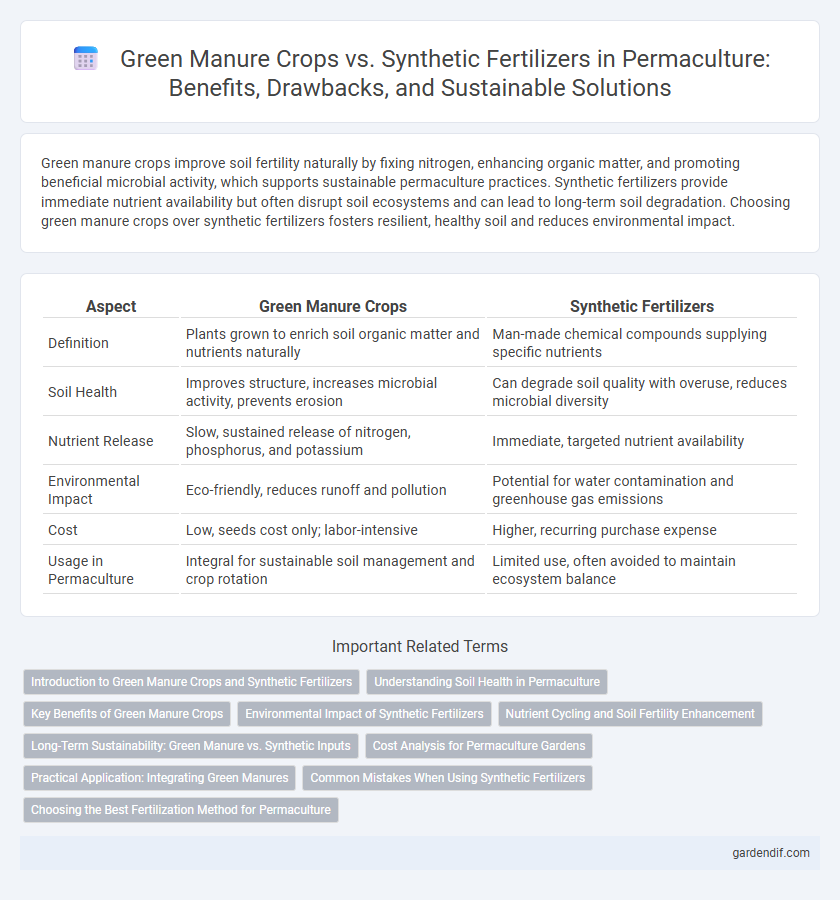
Green Manure Crops vs Synthetic Fertilizers Illustration
Green manure crops improve soil fertility naturally by fixing nitrogen, enhancing organic matter, and promoting beneficial microbial activity, which supports sustainable permaculture practices. Synthetic fertilizers provide immediate nutrient availability but often disrupt soil ecosystems and can lead to long-term soil degradation. Choosing green manure crops over synthetic fertilizers fosters resilient, healthy soil and reduces environmental impact.
Table of Comparison
| Aspect | Green Manure Crops | Synthetic Fertilizers |
|---|---|---|
| Definition | Plants grown to enrich soil organic matter and nutrients naturally | Man-made chemical compounds supplying specific nutrients |
| Soil Health | Improves structure, increases microbial activity, prevents erosion | Can degrade soil quality with overuse, reduces microbial diversity |
| Nutrient Release | Slow, sustained release of nitrogen, phosphorus, and potassium | Immediate, targeted nutrient availability |
| Environmental Impact | Eco-friendly, reduces runoff and pollution | Potential for water contamination and greenhouse gas emissions |
| Cost | Low, seeds cost only; labor-intensive | Higher, recurring purchase expense |
| Usage in Permaculture | Integral for sustainable soil management and crop rotation | Limited use, often avoided to maintain ecosystem balance |
Introduction to Green Manure Crops and Synthetic Fertilizers
Green manure crops, such as clover and vetch, naturally enhance soil fertility by fixing atmospheric nitrogen and adding organic matter, promoting sustainable agricultural practices. In contrast, synthetic fertilizers provide immediate nutrient availability through chemically manufactured compounds but may degrade soil health and biodiversity over time. Integrating green manure crops in permaculture systems fosters long-term soil vitality and reduces dependency on synthetic inputs.
Understanding Soil Health in Permaculture
Green manure crops enhance soil health by fixing nitrogen, improving organic matter, and promoting microbial activity, which supports sustainable nutrient cycling in permaculture systems. Synthetic fertilizers provide immediate nutrient availability but can disrupt soil microbial communities and lead to long-term soil degradation. Emphasizing green manure crops fosters resilient, fertile soil essential for sustainable permaculture practices.
Key Benefits of Green Manure Crops
Green manure crops improve soil fertility by fixing atmospheric nitrogen, enhancing organic matter content, and promoting beneficial microbial activity. They reduce soil erosion, retain moisture, and suppress weeds naturally, contributing to sustainable agriculture. Unlike synthetic fertilizers, green manure crops minimize harmful chemical runoff and promote long-term soil health.
Environmental Impact of Synthetic Fertilizers
Synthetic fertilizers contribute significantly to environmental degradation by causing soil acidification, water pollution through nutrient runoff, and greenhouse gas emissions such as nitrous oxide. Their production is energy-intensive, relying heavily on fossil fuels, which exacerbates carbon footprints. In contrast, green manure crops enhance soil health naturally by fixing nitrogen, improving organic matter, and reducing the need for chemical inputs, promoting sustainable and eco-friendly agricultural practices.
Nutrient Cycling and Soil Fertility Enhancement
Green manure crops, such as legumes and clover, play a crucial role in nutrient cycling by fixing atmospheric nitrogen and enriching soil organic matter, thereby enhancing soil fertility naturally. Unlike synthetic fertilizers, which provide immediate but short-lived nutrient availability, green manures improve soil structure and microbial activity, leading to sustained nutrient release and better long-term soil health. This biological approach reduces dependency on chemical inputs, promoting ecological balance and resilience in permaculture systems.
Long-Term Sustainability: Green Manure vs. Synthetic Inputs
Green manure crops enhance soil fertility by fixing nitrogen and improving organic matter, promoting long-term soil health and ecosystem resilience in permaculture systems. Synthetic fertilizers provide immediate nutrient boosts but often degrade soil structure and reduce microbial diversity over time, undermining sustainability. Integrating green manure crops supports sustainable nutrient cycling and soil regeneration, essential for permaculture's enduring productivity.
Cost Analysis for Permaculture Gardens
Green manure crops offer a cost-effective alternative to synthetic fertilizers by naturally enhancing soil fertility and reducing long-term input expenses in permaculture gardens. While synthetic fertilizers provide immediate nutrient boosts, their recurring purchase costs and potential soil degradation make them less sustainable. Investing in green manure crops leads to improved soil structure and nutrient cycling, resulting in sustained productivity and lower overall garden maintenance costs.
Practical Application: Integrating Green Manures
Integrating green manure crops within permaculture systems enhances soil fertility by naturally fixing nitrogen, improving soil structure, and increasing organic matter content compared to synthetic fertilizers. Practical application involves selecting leguminous plants like clover, vetch, or alfalfa to grow during off-season periods or as cover crops to suppress weeds and reduce erosion. This strategy promotes sustainable nutrient cycling, reduces chemical input, and supports long-term soil health essential for regenerative agriculture.
Common Mistakes When Using Synthetic Fertilizers
Excessive application of synthetic fertilizers often leads to nutrient runoff, polluting waterways and disrupting ecosystems. Ignoring soil health by relying solely on synthetic inputs can degrade microbial activity and reduce long-term fertility. Failure to balance fertilizers with organic matter like green manure crops results in imbalanced nutrient availability and diminished soil structure.
Choosing the Best Fertilization Method for Permaculture
Green manure crops improve soil health by fixing nitrogen, enhancing organic matter, and supporting beneficial microbial activity, making them ideal for sustainable permaculture systems. Synthetic fertilizers may provide rapid nutrient availability but often degrade soil structure and biodiversity over time, leading to decreased long-term fertility. Selecting green manure crops aligns with permaculture principles by fostering ecological balance, promoting resilience, and ensuring continuous nutrient cycling without harmful environmental impacts.
Green Manure Crops vs Synthetic Fertilizers Infographic

 gardendif.com
gardendif.com